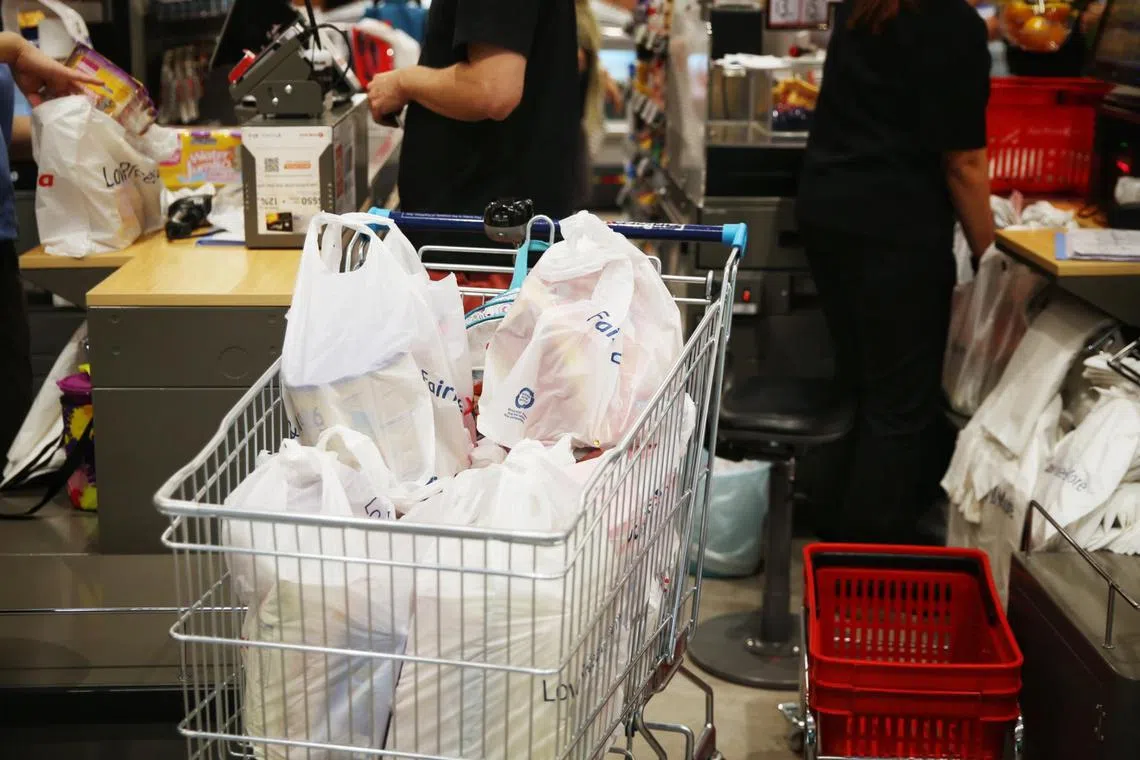Bill on plastic bag charge tabled, shoppers to pay 5 cents or more at most supermarkets from mid-2023
Sign up now: Get ST's newsletters delivered to your inbox

Two-thirds of all supermarket outlets in Singapore will impose the charge on all materials of disposable bags.
PHOTO: ST FILE
Follow topic:
SINGAPORE – From mid-2023, shoppers at most supermarkets will need to pay at least five cents for each disposable carrier bag.
Two-thirds of all supermarket outlets in Singapore – including FairPrice, Cold Storage, Giant, Sheng Siong and Prime – will impose the charge on disposable bags of all materials, including plastic and paper.
The upcoming carrier bag charge is among several proposed amendments to the Resource Sustainability Act tabled in Parliament on Monday. The aim of the proposed changes is to reduce packaging and food waste in Singapore. Only 6 per cent of all plastic waste was recycled in Singapore in 2021.
The carrier bag charge was first announced in early 2022.
The larger supermarket operators that will carry the charge have an annual turnover of more than $100 million and are better resourced to implement the requirements.
But smaller operators are encouraged to voluntarily implement their own bag charges, and many such retailers have already done so, said the National Environment Agency (NEA) and the Ministry of Sustainability and the Environment (MSE) in a joint statement on Monday.
These include The Body Shop as well as Cheers and FairPrice Xpress outlets, which started charging 10 cents for plastic bags per transaction in 2022.
“The minimum charge has been kept low to moderate the cost impact on shoppers, while encouraging them to be mindful of the number of disposable carrier bags they take,” the agencies said.
For accountability and transparency in the use of the carrier bag charge proceeds, supermarket operators will be required to publish information on the number of bags given to shoppers, the amount of proceeds received from the charge and how the proceeds are used, such as for the support of charitable or environmental causes, they added.
In furthering the recycling rate of drink bottles and cans by mid-2024, each beverage will likely cost 10 cents to 20 cents more. This deposit can be refunded when consumers return their used bottles and cans. This is part of the proposed beverage container return scheme.
The refund will likely be in the form of a cash or digital transfer, and beverage container return points will be set up at all supermarkets that are larger than 200 sq m. For instance, more than 130 FairPrice stores will participate in the scheme, said a spokesman for the supermarket chain.
A public consultation on the proposed return scheme, which had a report published in late 2022, proposed that the scheme include containers that are between 150ml and 3 litres. The bulk of the used cans and bottles is likely to be returned through smart reverse vending machines.
The scheme will also support the development of Singapore’s recycling industry, noted NEA and MSE.
As part of efforts to tackle food waste, industrial and commercial premises will be required to segregate their food waste, also starting in 2024. These buildings account for about 40 per cent of the food waste generated each year.
They will also be required to measure and report the amount of food waste they have segregated for treatment.
In 2021, Singapore generated 817,000 tonnes of food waste, of which 19 per cent was recycled.


